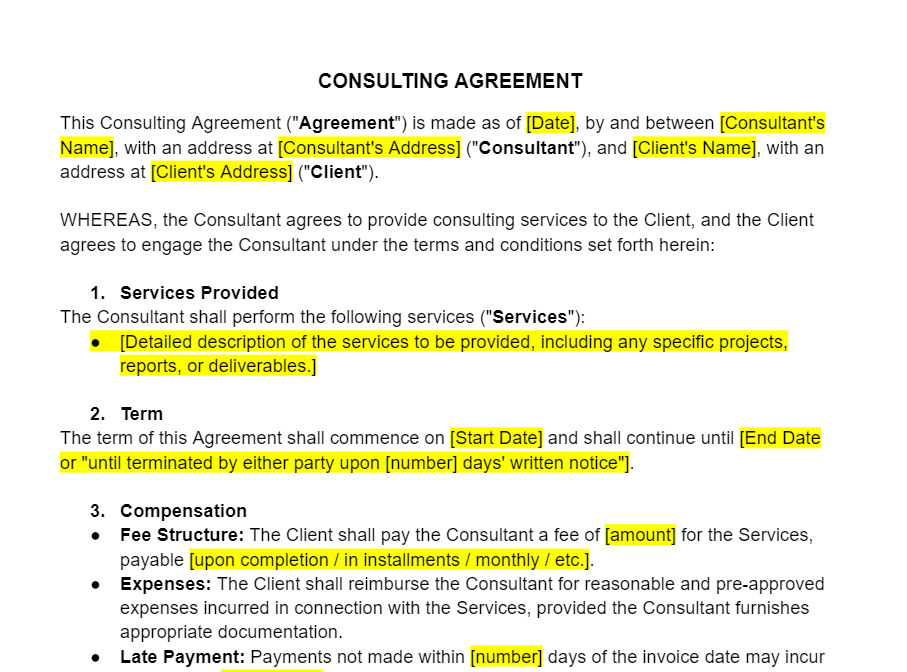
Consulting Contract Template
11 Downloads
Commercial, Employment
January 11, 2025
Sayantani Dutta
From a business perspective, it’s cheaper for companies to hire consultants and subcontractors than spending resources to invest in training and retaining full-time employees. Organizations with full-time workforces need to consider not only the direct expense of paying salaries and awarding bonuses. Investments in payroll infrastructure, managing taxes and insurance, and the cost of equipment and office space make hiring consultants an attractive option for companies.
Companies don’t have to worry about the long-term costs associated with full-time employees when they work with subcontractors. Hiring these professionals for specific projects and tasks helps HR teams and companies avoid the risk of navigating the legal minefield of hiring and firing permanent staff. These specialists help the company achieve its goals and objectives, without the need to invest in expensive training programs.
Companies do face the risk of consultants being reclassified as employees, making the business liable for delinquent employer taxes, interest on those outstanding taxes, and financial penalties issued by the state tax authority or IRS.
While companies can’t completely protect the organization from these contract audits and reclassification issues, having consulting services agreements in place between subcontractors and the organization can offer some level of protection to the employer.
What are the Key Considerations In a Consulting Contract?
The consulting agreement protects the rights of both parties during the duration of the contract. Before the subcontractor and employer finalize the subject matter and terms of the contract the parties must meet formally to discuss what they want included in the contract and the obligations the parties have to each other.
The contract contains the following agreed-on terms at a minimum.
Description of Duties
The agreement must clearly outline the consultant’s obligations to the employer for the duration of the contract. The description of duties includes the consultant’s scope of work for the project and the deadlines for completion, along with the deliverables expected from them by the end of the contract or at specific project milestones.
This section should also include the amount due to the contractor for the work and the terms of payment. The employer and contractor should meet before finalizing the contract to flesh out the terms before memorializing it in writing.
Guidelines
The guidelines provision of this agreement covers the laws of the state surrounding the hiring of independent contractors like consultants. In recent years, we’ve seen several states make it difficult for consultants to qualify as independent contractors, imposing absolute requirements on the freedoms consultants have from organizational control.
Signatures and Contract Renewals
After drafting the agreement the parties sign it and both get a copy for their records. If the consultant wishes to renew the contract at the end of its term they can review the provisions and request changes as required.
Some contracts require the agreement to be notarized or witnessed, especially in the case where the hiring company requires the consultant to work with its intellectual property or become familiar with its trade secrets.
An attorney’s assistance isn’t always required to complete the terms and conditions of the contract. However, in some situations, such as contracts with extensive terms and conditions or requiring protections like NDAs, it might be advisable to speak to an attorney and have them structure and revise the agreement.
Review and Revision
After the first draft, the subcontractor should review the agreement and request any revisions. The parties must understand the provisions and how they affect the consultant’s work. The parties must fully understand every aspect of the agreement before signing it to avoid miscommunication later in the contract term or on its expiry.
After signing, the contract formalizes the terms of the contract, creating a legally binding written agreement that’s enforceable in a court of law.
Unpacking The Clauses in the Consulting Contract
The provision-by-provision instructions in this section help you understand the terms of this agreement and how to structure the contract to protect both parties.
Introduction
This section outlines the parties to the contract and lists basic information identifying the company and the consultant. It mentions the effective date of this agreement and a short description of the company and its nature of business.
Responsibilities
This section provides details on the company’s and the subcontractor’s obligations to each other under the terms of the agreement and the professional services and work agreed upon.
It mentions the deliverables expected by the company at the end of the contract and the specific performance of the services and milestones to be achieved by the consultant or consulting firm to make good on the contract terms.
The Nature of the Contractual Relationship
This part unpacks the nature of the relationship between the consultant and the company. It mentions that the consultant is an independent contractor, not an employee, and provides services to the company in this capacity only.
This distinction is important for legal reasons. It covers the company’s responsibilities (or lack thereof) for health insurance, workers’ compensation, social security coverage, taxes, and liability. The contract emphasizes the divide, and the parties shouldn’t blur the line between independent contractors and employees in terms of the performance of duties.
Review state laws governing the hiring of independent contractors to ensure the agreement follows all local restrictions on hiring consultants to work at the company under applicable law.
Confidentiality
The contractor may need to agree to sign a confidentiality agreement to protect the company’s trade secrets. The company may issue an NDA to the contractor as part of this provision of the agreement. The non-compete clause prevents the contractor from working for companies in the same sector for a specified period, usually two to three months after the contract ends.
Use of Trademarks
This section states that the subcontractor can’t use the company’s intellectual property or trademarks during or after completing the contract.
Warranties and Representations
Details promises the parties make to each other under the terms of the contract.
Remuneration
In this section, the company mentions the payment terms. It outlines how they intend to pay the contractor via an hourly rate or flat fee, and how the company will issue a retainer to handle any reimbursement of expenses incurred by the consultant during the duration of the contract. The consultant acknowledges their responsibility for paying income taxes.
Industry standards usually allow the company to pay the consultant up to 60 days after completing the contract. How the company handles its accounts receivable determines the payment times and the circumstances surrounding when the company will not pay. For instance, the company may refuse to pay the consultant’s meal and accommodation expenses but agree to pay for travel expenses.
Work for Hire
The work made for hire section of the agreement grants the company ownership rights to all work and deliverables produced by the consultant under the terms and duration of the contract. The consultant commits to assign its interest to the company.
Reporting
This section covers the reporting responsibilities of the consultant and who they will report to within the company throughout the contract duration. The company should nominate a contact person to handle any reporting communications with the consultant, and the type of information to be reported.
Conflict of Interest
The consultant provides written confirmation that they aren’t currently working for other companies in the employer’s sector.
Contract Term
This provision states that the contract lasts until its agreed-upon termination date and the consultant finishes fulfilling their obligations to the company in terms of the specifics of the deliverables mentioned in the contract.
Return of Company Property
This section mentions the time period the consultant has to return company property used during the contract after fulfilling their obligations. The company should include information on any exclusive property used by the consultant during the agreement term. The company can also write a clause stating that the contractor is liable for the cost of replacing any damaged property.
Contract Termination
This section outlines the grounds for termination of this agreement and the competent jurisdiction for any legal repercussions between the agreement of the parties and their commitments to each other. It mentions the events or actions, including material breach or written notice that cause the contract to finish outside of the agreed-upon timeframe. It also includes the notice period the parties have to notify each other of early termination or a breach of contract.
Indemnification
This section provides both parties with indemnity from the other party’s negligence or misconduct.
Assignment
This section explains that the parties must receive written permission from each other before assigning interests and obligations.
Modification
Indicates that any changes to the contract must be in writing and agreed upon by both parties before going into effect.
No Implied Waiver
If either party permits the other to break or ignore their obligation to the other party, it doesn’t mean that the party waives their future rights to fulfill those obligations.
Force Majeure
This clause allows the parties to terminate the contract under an act outside of their control, such as a natural disaster. These conditions make the consultant unable to complete the tasks required of them under the terms of the agreement.
Notice
Mentions the physical and mailing addresses for legal or official correspondence.
Governing law
Mentions the state laws used to interpret the consulting contract.
Severability
The severability and entire agreement clause protect the contract as a whole even if some of its terms are invalidated later. It mentions the enforceability of the remaining terms in the agreement.
Signatures
This section provides a space for the company representative and consultant to sign the contract and make the agreement of the parties official.
Download a Customizable Consulting Contract from FreshDox
Sign up for a free 7-day trial of a Basic or Premium account and get access to our customizable
consulting agreement template, along with hundreds of other professionally designed templates for business. Basic accounts qualify for three free downloads per week, and PRemium accounts get access to unlimited downloads. Our consulting contract template is easy to tailor to your requirements, and readily available for download in PDF and Word formats.
Related Templates
Discover more templates that align with your needs and preferences.

Ready to Sign Up?
Sign up for FreshDox.com’s 7-day trial and discover why so many individuals and businesses trust us for their legal document template needs.
- Cancel any time
- 7-day free trial
- From 300+ Customer Reviews
















